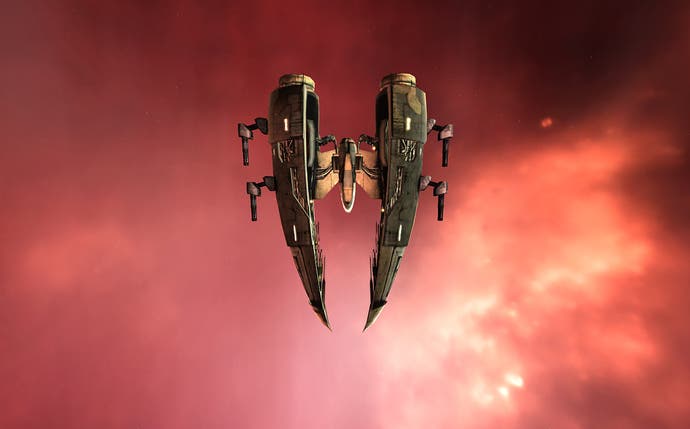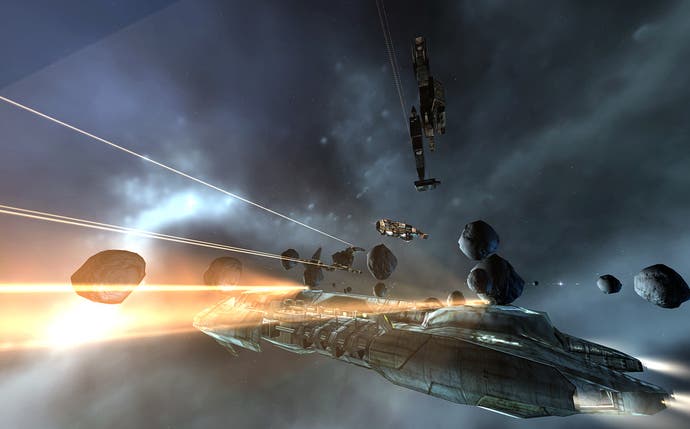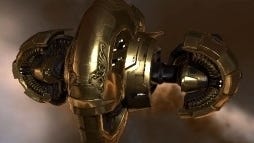EVE Online: Trade & Industry
Pruning the virtual money tree.
For those strange people who are interested in crafting, trading, and other non-violent MMO activities, there is no finer or more complex game than EVE Online. Part of EVE's principles of human interaction is that it's the players who have to produce most of the traded goods in the game world. Rather than relying on NPC spawns and loot drops for the majority of its weapons, ships, and ammunition, everything in the game world has to be manufactured by players. There are still some rare item drops, of course, but the day-to-day ship construction and the general shopping done by the masses has to be provided for by the, er, masses.
Entire alliances are now dedicated to nothing more than making money peacefully. Entirely non-violent corporations now exist for the sole purposes of making all the toys that the violent alliances use to blast each other into spacedust, and many players now have an "industrial alt", a second character trained entirely for trade and industry specialities.
So, let's look at some of those industrial possibilities. The most basic is that of a trader: buy goods in one place in Empire and ship them somewhere else, thus making a profit. It's a popular business, and the freighter-owning bigwigs of the trade arena have most areas pinned down. Competition is fierce, and it'll only get tougher as the traders get better at their jobs.
The other possibility - one that made EVE famous, and famously boring - is mining. This is actually a remarkably complex exercise these days, with vast numbers of tools at the disposal of the miners involved. It can also be very dangerous if the mining takes place within the rich belts of 0.0 space, where rare ores lie. The major mining operations that take place within deep space are as complex as combat fleet ops, with scouts watching for incoming raiders, the miners themselves working on the belts, tanks taking the aggro from the NPC spawns, and haulers taking the materials back and forth to the nearby refineries. Major operations can net hundreds of millions in isk in a single evening. There is no better isk-per-second reward in the game.

Even if it's undertaken in Empire, money can be made from mining. The basic minerals of pyerite and tritanium are in constant demand on the market, and their price only increases as wars blossom, and the production of battleships and capital ships consume vast amounts of the "low-end" ingredients. Many large, dedicated mining corporations now exist in Empire space, and it's impressive to watch their huge mining teams sweeping through systems, completely clearing belt after belt, and hauling it back to stations to be refined. Learning to pilot the vast "Hulk" mining ships is a task in itself, and the immense jump-capable Rorqual capital industrial platform could take many months to achieve.
It's not all about grinding space rocks, though. It's entirely possible that you could make money inventing the higher end "Tech 2" items. The invention process requires a huge amount of cash, however, thanks to the complexity of the infrastructure you'll need. Once you've got the invention equipment and the various components, you'll still need to master production skills to make the most of the blueprints you come up with. Get all this right and you'll be able to compete on the exclusive Tech 2 market, where desirables such as Tech 2 weapons, and high-end heavy assault cruisers are found.
There's even the potential for "passive" income in EVE, where your investment in time to skills can pay off. The most basic of these is in the datacores which fund invention. These are made by NPC characters with whom you can set up a research contract. Your skills combined with their rating dictates how many cores they will produce. With enough agents (and enough alts farming those agents) you can make a small income without having to do anything other than pick up the cores and sell them every few months. With datacores being constantly used by the inventors, it's a pretty stable investment.

Better yet, although slightly more risky, is moon mining. Generally the best moons are found in 0.0 space, so you're likely to need some kind of foothold outside of Empire to be able to do this safely. However, the best moons make millions of isk per hour, and the "high ends" have a yield that results in immense territory wars. You don't have to go for these ones, of course, and there are plenty of lesser moons that, when combined with other products, produce components for the invention market. Once it's set up, all you'll have to do is to refuel the moon mining structure, and to empty the silo once a week. Free money.
With all these possibilities now available in the game, it should be clear that scope of trade and industry in EVE is unlike that of any other game. Many players make their fortunes without ever firing a shot, so healthy is the EVE economy. While it all ends up funding wars, you don't have to get involved in the fighting to profit. In fact, EVE's economy is so complex that developers CCP hired a professional economist in 2007. Dr. Eyjo Gudmundsson has been compiling information on EVE's "pure capitalist" markets, and now authors a quarterly report looking at trends within the game world. If a particular resource has gone up in price he points it out, and offers a few suggestions as to why that particular trend can be seen on his array of graphs and statistics.
It's this commitment to making EVE a game of economics as much as it is a game of spaceships that makes the project unique. Without the free and complex financial world it could not possibly be as free or as diverse as it has become.









